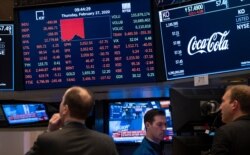History was made Thursday on Wall Street, but not the kind of history investors welcome.
Fears about the coronavirus and its effects on global trade and manufacturing sent the Dow Jones industrial average plummeting 1,191 points, the largest single-day drop in history. It marked a 4% single-day decline in the value of stocks traded on the New York exchange and a 10% decline in the Dow from its record high set two weeks ago.
The Standard and Poor’s 500 and Nasdaq Composite Index also dropped more than 4%. The S&P’s decline was its sharpest one-day drop in nine years.
European markets fared no better, with major British, French and German indexes all down more than 3%.
This was the sixth straight day of big sell-offs and Wall Street's worst week since the global financial crisis of 2008. U.S. investors are nervous about the coronavirus and warnings from the World Health Organization that governments should prepare for what it called a "potential pandemic."
Tech stocks down
Technology stocks were down Thursday, with such giants as Apple and Microsoft warning that the virus had affected supply lines from Asia.
Energy stocks also took a beating, in part over a recent drop in oil prices and anticipation that fewer people will travel because of the virus.
No one knows where the coronavirus outbreak is heading, because health experts are still learning about COVID-19. As of Thursday evening, it had stricken more than 83,000 people around the world and killed more than 2,800.
U.S. indexes had been at record highs, and Merrill Lynch financial adviser Andrew Weltlinger said the coronavirus had "spooked" investors and unnerved a market that was due for a correction.
Weltinger said natural corrections of 10% or more used to happen about three times a year, but when they happen once every three years, as has been the case more recently, it looks much worse.
He said there were no measurable signs that the coronavirus was affecting the U.S. economy, and he said he thought the worst would end as soon as scientists learned more about the illness.
Advice: Keep calm
Weltinger's advice to investors was not to panic, not to sell low, and to have a diversified portfolio that includes bonds, which are up this week because people view them as a safer investment when stocks hit a rocky patch.
U.S. markets dropped even after President Donald Trump late Wednesday described the coronavirus risk in the U.S. as "very low."
Trump has only partly blamed the market drop on the coronavirus. He said the large field of Democratic presidential contenders, including Bernie Sanders and his pro-socialistic policy proposals, was turning buyers off stocks.
"I think they're very upset when they look at the Democrat candidates standing on the stage making fools out of themselves," Trump said, predicting the market would surge again if he was re-elected.





